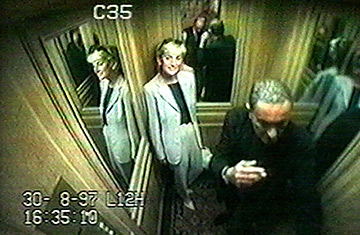
Diana, Princess of Wales with Dodi Fayed in the elevator at the Ritz Hotel, Paris, the afternoon before they both died.
Six months of testimony, 250 witnesses, a $6 million bill for the British taxpayer, and 23 hours of deliberation by the jury have all boiled down to one moment. On April 7, at around 4.30pm London time, five men and six women delivered their verdict on the deaths of Diana, Princess of Wales, and her boyfriend Dodi Al-Fayed, officially closing the book on what seemed a never-ending story. Their decision: unlawful killing due to the negligence of the paparazzi and driver Henri Paul.
Originally instructed to emerge with a unanimous verdict, the jury was deadlocked into the fourth day of deliberations. The judge, coroner Scott Baker, then told them he would accept a majority decision of nine jurors. An hour after that, they came back with "unlawful killing." In an inquest of few real surprises, this was one of the biggest. Most observers had thought they would agree with the conclusions of the French and British police, ruling the incident an accident. But the jury decided someone had to take the blame.
The unlawful killing verdict — essentially a verdict of manslaughter — was the most serious of the five available to the jury. Before Baker sent the jury out to deliberate on April 2, he laid out these options for them:
1) Unlawful killing: grossly negligent driving of the following vehicles [the paparazzi]
2) Unlawful killing: grossly negligent driving of the Mercedes [by Henri Paul, who also died in the crash]
3) Unlawful killing: grossly negligent driving of the following vehicles and of the Mercedes
4) Accidental death
5) Open verdict [none of the above]
Not included was the conspiracy theory that Dodi's father, Harrods owner Mohamed Al-Fayed, has been pushing from the start, claiming that Prince Philip had ordered Britain's intelligence service, MI6, to orchestrate the crash and kill the two lovers. Baker explained throughout the entire inquest that he had not seen "a shred of evidence" to prove that the Duke of Edinburgh or the British intelligence service were behind the crash, so he was legally obliged not to offer "staged accident" as a possible verdict. But even with murder off the table, the panel decided to assign responsiblity for the death.
In their verdict, nine of the jurors agreed that "the crash was caused or contributed to by the speed and manner of driving of the Mercedes, the speed and manner of driving of the following vehicles [and] the impairment of the judgment of the driver of the Mercedes through alcohol." And all eleven believed that the fact that Diana and Dodi weren't wearing seat belts and that the Mercedes hit a pillar in the Pont d'Alma tunnel, instead of a larger surface that might have lessened the impact, were major factors in the deaths. Just as Baker directed, the jury delivered exactly the same verdict for both Diana and Dodi.
So what now? Well, not much. While the coroner recognized that "unlawful killing is a form of the very serious crime of manslaughter," the inquest is not a criminal trial. The verdict can't be used to launch a criminal investigation or prompt the pressing of charges against any of the paparazzi who are still alive. (Even if it could, Britain's Crown Prosecution can't prosecute foreign nationals for crimes committed abroad, and all of the paparazzi involved are foreigners.)
The fact that murder was never an option to the jury is a blow to Mohamed Al Fayed, who at the start of the inquest said he would accept the jury's verdict, whatever it was. In a statement read on his behalf immediately after the verdict was delivered, he said he was "disappointed," and that "The French and [British] inquiries were wrong and these inquests prove it." Taking a jab at the coroner, he criticized Baker's "accusations against me," adding "I feel that my character and beliefs... have been on trial." He remains convinced of conspiracy. As he was leaving the court, Al Fayed told the waiting press, "The most important thing is it is murder."
This may look a lot like the closure that so many have been waiting for. But over its six months, the inquest brought up a bunch of questions that were never fully answered: What happened to the letters that were in Diana's keepsake box, the letters that some of her friends say showed Prince Philip's animosity towards the Princess? Exactly how serious was Diana and Dodi's relationship? Will Trevor Rees, the only survivor of the crash, ever remember anything about what happened?
For the Royal Family, the British courts, most of the watching British public and, possibly, Al Fayed, this verdict marks The End of a long, exhausting and bewildering saga. But for anyone who likes melodramas about rebellious princesses, it's just another chapter.
